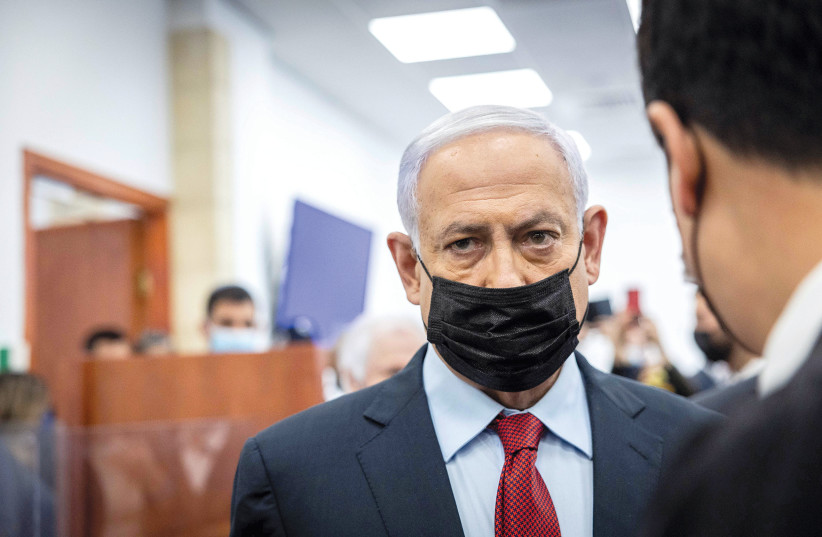What threats might Attorney-General Gali Baharav-Miara face from the incoming government, and how is she handling them?
It is too early to say.
The Jerusalem Post has learned that Baharav-Miara is much less certain than much of the media that any of the worst threats ascribed to the incoming government of Benjamin Netanyahu will actually come to pass.
Not that she is unconcerned. Any human being with a heartbeat, no matter how rational and focused on the job, would be concerned by public threats made during election season.
But the key to her current state of mind is the phrase “election season.”

The threats have included everything from outright firing to limiting her to becoming the state’s top legal adviser and selecting a new chief prosecutor.
Baharav-Miara believes there is a good chance, now that Netanyahu has secured his return to power, that he might return to a relative position of respecting the legal establishment as long as he does not see his ongoing public corruption trial as concretely threatening to topple him.
Given that the trial may run another 12-18 months, after which he could draw out the process easily for another six months with an appeal to the Supreme Court, he has time before he would need to worry.
Even many objective observers believe that the prosecution might fall short of securing a conviction for bribery.
If the “only” convictions the prosecution gets are for breach of trust, that may not be enough to oust Netanyahu from power, anyway.
In that case, he would join a line of recent political officials who were convicted without being knocked out of politics, and his role as prime minister gives him unique staying power.
Others are not as optimistic as Baharav-Miara
While essentially no one wanted to go on record due to the sensitivity of the issues, some top former Justice Ministry officials are deeply concerned that Netanyahu wants to guarantee his hold on power or take revenge on those he views as having provided the basis to oust him for the last 17 months.
According to these officials, Netanyahu of November 2022 will never go back to being Netanyahu pre-2018, when his criminal case went into overdrive and he started to attack law enforcement in ways he had never done before.
And it is also not clear that Netanyahu can hold back every threat now that he empowered the Religious Zionist Party to reach around 14 MKs.
Simply put, the RZP might be willing to drop some of its ultimate dreams to redo the legal establishment, but it could refuse to join the government if it cannot check some boxes.
In that context, splitting the powers of the attorney-general into legal adviser and chief prosecutor is more likely and would be less of a shock to the system than firing Baharav-Miara.
The fact is, most justice ministers for the last 15 years have wanted to do this and were stopped by Netanyahu.
Even the outgoing government in which Gideon Sa’ar has been justice minister wanted, theoretically, to split the role but needed more time to negotiate the details with the coalition’s left-wing parties.
There are some scenarios in which Sa’ar might even support the government on splitting the role.
And Baharav-Miara was ready to live with such a split.
Unofficially, one of the reasons Sa’ar picked her for the job, as opposed to some other highly qualified candidates, was that she would not oppose having her own powers split at some point.
Splitting her role would not be as radical a change as firing her and replacing her with an official who would track his or her policy to revolutionize the system. However, splitting the role, in and of itself, would achieve one of the dreams of the country’s right wing dating back 15 years.
The next question would be whether the new chief prosecutor – would it be current chief Amit Aisman or a new prosecutor? – would be selected or pressured in order to cut a favorable plea deal with Netanyahu.
Such a middle-of-the-road outcome could fit for Netanyahu if he wants to restore his image as a moderate because he would not be canceling his trial, just cutting a deal that even former attorney-general Avichai Mandelblit had seriously considered.
If the new government tried to replace Aisman, it could face a challenge before the Supreme Court since the court previously ruled that Netanyahu could not influence appointments that could impact his trial.
In this case, there is even a scenario in which the government might formally split the roles, but allow Aisman to stay in charge until the Netanyahu trial concludes, and then replace him.
Either way, it is not clear that Baharav-Miara would fight to maintain control of the Netanyahu trial if her role is split, given that she did not file the indictment and only joined the case midstream.
Other reasons Baharav-Miara might need to worry were specific decisions she made that upset Netanyahu and the incoming government’s political parties, including: allowing the outgoing government, during election season, to appoint a new IDF chief, and to sign a diplomatic deal with Lebanon.
Baharav-Miara also protected the Balad Party’s right to run for Knesset and fought the Supreme Court to try to keep Menachem Mazuz as chairman of the senior government officials vetting committee for the next eight years.
But Netanyahu might overlook these issues at the end of the day.
The new IDF chief Hertzi Halevi is no left-winger, much of the country supports the diplomatic deal with Lebanon, the Supreme Court itself vetoed Mazuz, and Balad did not get enough votes to get into the Knesset.
Netanyahu might say no harm, no foul.
But if he seeks revenge and moves to fire Baharav-Miara, there will be a constitutional crisis between his new government and the Supreme Court beyond anything the country has ever seen.
